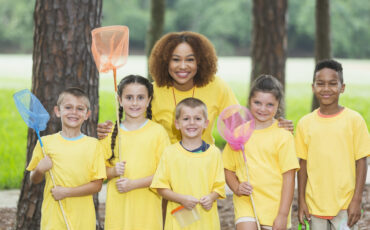It’s Election Time!

Table of Contents
Teach your kids about the voting process – and much more about America.
by Kathy Sena
As the 2014 election enters it's final hours, it’s a great time to teach kids how our electoral process works. It’s also a wonderful opportunity to help our children develop a love of – and an appreciation for – our country. Here are some tips for involving kids in the voting process, for making U.S. history come alive, for remembering our veterans and more.
Teach Kids How Elections Work
Even children in elementary school can get involved in learning about elections if you keep things simple and fun. During a previous presidential election, when our son Matt was almost 5, we explained – in very basic terms – how the electoral college worked. (Confession: We had to research that a bit ourselves first!) As Election Day neared, we printed colorful electoral-college maps from the Internet to show which states were leaning toward which candidates. We watched the presidential debates together and huddled around the television on election night.
Take the Kids to the Polls
At some voting precincts, children can stand alongside parents while they vote, and sometimes even get a children’s practice ballot. Matt has happily “voted” for Abraham Lincoln for president on more than one occasion. “The most important thing you can do to help generate your kids’ interest in the public process is to take them to vote with you,” says Marika Bergsund, who has three children. “They have all been voting with us since they were toddlers. We always include them in reviewing the voting materials and prepping our sample ballot. And we let them help in the voting booth. We treat voting like a very special privilege that should be valued – which it is!”
Follow Local Politics
Kids need to know that their mayor, city council and school board make decisions that affect their lives. For a community report in third grade, we took Matt to visit the local city council chambers. He got to see the mayor’s office (and pick up the gavel – a big treat), sit where the council members sit during meetings, and learn how decisions are made. This is also a good place to teach kids that, when they start voting, their vote will matter. “We follow all local elections to help our daughter understand the importance of every single vote,” says Joyce Fahey. After a city council election in a nearby town was won by less than 10 votes, “we talked about the fact that the losing candidate undoubtedly had 10 friends who were ‘just too busy’ to take the time to vote,” she adds.
Sing America’s Songs
A University of Florida study found that we are losing a large part of our national identity because we so seldom sing traditional American songs. Researchers note that many of our national songs are being ignored in favor of pop hits, and that today’s children are more likely to know the lyrics to the latest Taylor Swift song than to patriotic, folk and traditional children’s songs. “Although Americans say that the singing of folk songs and songs of our heritage is important, we are teaching very few of them in the schools,” says music professor Russell Robinson, who supervised the study. That’s why it’s more important than ever to enjoy these songs at home. CDs of classic American songs are available at your local library. Visit scoutsongs.com for lyrics to “America the Beautiful,” “I’m a Yankee Doodle Dandy,” “This Land Is Your Land” and many other traditional American songs.
Visit America’s Historic Sites
Washington, D.C. makes for a meaningful family getaway. Visit the various war memorials and the Smithsonian, as well as the Lincoln Memorial, Washington Monument and the U.S. Capitol. These are awe-inspiring to kids. A family trip to Boston is where you’ll find the Freedom Trail, Paul Revere’s house and a re-enactment of the Boston Tea Party.
Talk With a Veteran
“My grandson’s school presents a patriotic program each year,” says Ellen Herron. Veterans and public safety officers are invited, along with family and friends. “The students each write a ‘Dear Soldier’ letter, some of which are read during the program,” she adds. Other families report that a visit to a veterans’ hospital, whether as a family or as part of a school, scouting or church group, was particularly meaningful for their family. Interviewing a veteran is a great way for kids to learn about our country’s history and to show appreciation for those who have sacrificed for our freedom. “Our kids enjoy talking to their grandpa and looking over anything he has that relates to when he was in World War II,” says Joy Hall, mom of two. She also suggests interviewing veterans to learn about their wartime experiences.
Set an Example
Kids watch what we do, and our actions tell them what we value, says Hall. “We display a flag, we turn on the TV for inaugural events, and we watch State of the Union addresses and presidential funerals,” she adds. “We also write letters to enlisted men and women.” One of the most important things we can give our children is to pass on our own love for America, says Hall. “Nothing can replace the pride and tears they see in your eyes at certain times that are significant to our country.”







